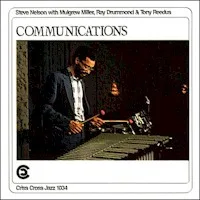Styles: Guitar Jazz
Year: 1998
File: MP3@320K/s
Time: 44:20
Size: 101,5 MB
Art: Front
(4:21) 1. Fly like an eagle
(3:50) 2. If only
(4:36) 3. On my way
(4:22) 4. Ooh child
(5:51) 5. Jj's groove
(4:38) 6. April goodbyes
(4:50) 7. Souls felt
(5:02) 8. Jinda boogie
(4:38) 9. Didn't i (blow your mind this time)
(2:08) 10. Song for a princess
Dead set on achieving success as a smooth jazz guitarist, Ed Hamilton seems to have abandoned some of the playful sense of humor and adventurous edge which characterized his first two albums. Groovology features beautiful compositions and a solid mix of subtle warmth (as on the tribute "Song for a Princess") and more jumpy expressions which remind us of his sharp improvisational skills. Hamilton also plays the ace card of seamlessly interacting with the soprano sax of Tim Ries over the floating synth textures of pieces like "If Only" and "Ooh Child." Likewise, he creates interesting mood swings by varying his tones from high to low over a bubbling, synth-created, blues organ flavor throughout the light funk cover of "Fly Like an Eagle." It's all perfectly amiable, yet considering the artistic splash his previous works made, Hamilton plays it too close to the vest; there are few traces of the brew of hard rock, avant-garde, spacy fusion, and bebop that made his Path to the Heartland such an eye opener. ~ Jonathan Widran http://www.allmusic.com/album/groovology-mw0000040898
Personnel: Ed Hamilton (guitar, keyboards, bass, programming); Tim Ries (saxophone); Dave Falciani (piano).
Groovology
Year: 1998
File: MP3@320K/s
Time: 44:20
Size: 101,5 MB
Art: Front
(4:21) 1. Fly like an eagle
(3:50) 2. If only
(4:36) 3. On my way
(4:22) 4. Ooh child
(5:51) 5. Jj's groove
(4:38) 6. April goodbyes
(4:50) 7. Souls felt
(5:02) 8. Jinda boogie
(4:38) 9. Didn't i (blow your mind this time)
(2:08) 10. Song for a princess
Dead set on achieving success as a smooth jazz guitarist, Ed Hamilton seems to have abandoned some of the playful sense of humor and adventurous edge which characterized his first two albums. Groovology features beautiful compositions and a solid mix of subtle warmth (as on the tribute "Song for a Princess") and more jumpy expressions which remind us of his sharp improvisational skills. Hamilton also plays the ace card of seamlessly interacting with the soprano sax of Tim Ries over the floating synth textures of pieces like "If Only" and "Ooh Child." Likewise, he creates interesting mood swings by varying his tones from high to low over a bubbling, synth-created, blues organ flavor throughout the light funk cover of "Fly Like an Eagle." It's all perfectly amiable, yet considering the artistic splash his previous works made, Hamilton plays it too close to the vest; there are few traces of the brew of hard rock, avant-garde, spacy fusion, and bebop that made his Path to the Heartland such an eye opener. ~ Jonathan Widran http://www.allmusic.com/album/groovology-mw0000040898
Personnel: Ed Hamilton (guitar, keyboards, bass, programming); Tim Ries (saxophone); Dave Falciani (piano).
Groovology




















